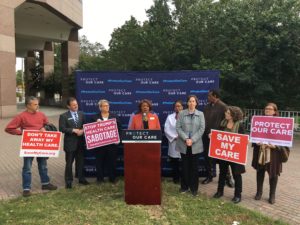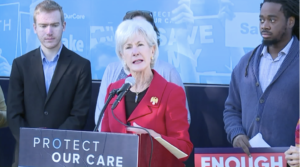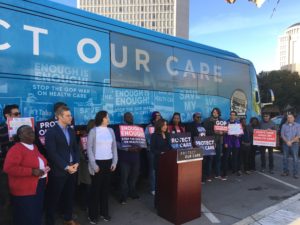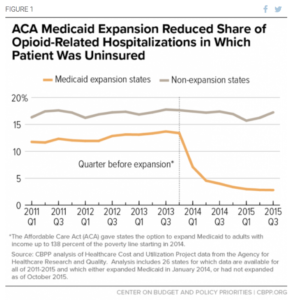Linda Coleman, Local Health Care Advocates Join Protect Our Care to Call for an End to GOP Attacks on North Carolinians’ Health Care

Linda Coleman speaks on the Halifax Mall in Raleigh.
RALEIGH, NORTH CAROLINA – This afternoon, Protect Our Care’s nationwide bus tour arrived in Raleigh to call attention to the ongoing Republican war on health care care. Headlined by Linda Coleman, Allison Dahle, Mack Paul, and health care advocate Laura Packard, the event highlighted the actions Republicans are taking to harm North Carolinians’ care and called on Rep. George Holding to work instead to protect our care.
“It’s a crisis. We’ve got to make sure we protect people with pre-existing conditions,” said Linda Coleman. “As soon as the the 2019 session begins, every Republican is going to vote to repeal whatever protections they have already gutted, and so what’s going to be left is nothing. We’ve got to fight to make sure people have the right to quality, affordable, accessible health care.”
Coleman’s thoughts were echoed by Mack Paul and Allison Dahle.
“400,000 adults, 150,000 children could be covered if we expanded Medicaid,” said Paul. “These are people who are not going to the doctor when they need to, end up in the emergency room, folks who would become bankrupt if they have a severe medical situation. We need to support that. It’s time we put people ahead of politics.”
“If we were to expand Medicaid, people could actually get their health care,” said Dahle, echoing Paul’s comments on the hundreds of thousands of North Carolinians who have been denied coverage due to Republicans’ actions. “I am ready to expand Medicaid so that we have more alternatives for more people to provide a better health and a better future for North Carolina.”
The importance of Coleman, Paul, and Dahle’s comments were made clear by cancer survivor Laura Packard.
“I’m alive because of the Affordable Care Act,” said Packard. “I’m a stage four cancer survivor and I’m on this tour to defend our attacks against the GOP. President Trump may have blocked me on Twitter, but he can’t stop me and the American people from fighting to protect our care.”
Coleman, Paul, Dahle, and Packard were joined by Dr. Eleanor Greene, former president of the North Carolina Medical Board, who spoke of the difficulty her patients faced before the Affordable Care Act was signed into law and the consequences repeal would bring, and Stacy Staggs, whose daughters were born prematurely and are covered by Medicaid, who spoke of the importance of maintaining this crucial program.
At today’s event, Raleigh residents, health care advocates, elected officials, and members of Protect Our Care detailed the numbers ways in which Republicans have attacked health care, and how these actions have cut coverage and increased costs for North Carolinians’. Because of the Republican repeal-and-sabotage agenda:
- North Carolinians have seen years of premium increases. It’s expected that 40 year old North Carolinians will face paying an extra $1,440 for marketplace coverage in 2019 because of Republican sabotage of the health care market.
- In North Carolina, out of pocket costs for older people could have increased by as much as $21,018 by 2026 if the House-passed American Health Care Act had become law.
- As many as 400,000 North Carolinians have been denied access to affordable health coverage through Republican state officials’ refusal to expand Medicaid.
- Junk insurance plans that charge money for skimpy coverage could return to North Carolina and 402,000 North Carolinians could lack comprehensive coverage in 2019 because they will either become uninsured or will be enrolled in junk plans that don’t provide key health benefits.
- More than 450,000 North Carolinians who have obtained health insurance through the ACA marketplace could lose their coverage if a judge sides with President Trump and the GOP in their lawsuit; and protections for 3.9 million North Carolinians living with a pre-existing condition would be in jeopardy.
- Hundreds of billions of dollars have been cut from Medicare.
- Dozens of hospitals in rural areas have closed, including five in North Carolina, exacerbating the care and coverage gaps that exist for families in America’s rural communities.
- Rep. George Holding voted for and passed a health care repeal bill that would cause 23 million people to lose coverage and gut protections for people with pre-existing condition; voted for a budget amendment that would cut Medicaid by $700 billion over ten years, $114 billion in a single year alone; voted for a tax scam that doubled as a sneaky repeal of the Affordable Care Act by kicking 13 million people off of their insurance and raising premiums by double digits for millions more.
Tomorrow, “Care Force One” will head to Atlanta, Georgia. For more information, please visit protectourcarebustour.com.




